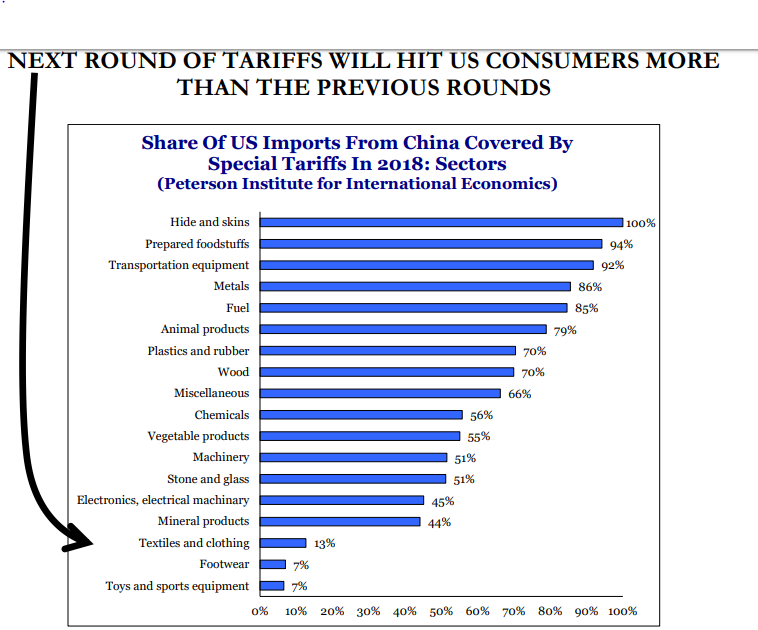If President Donald Trump slaps China with all the tariffs he's threatened, the U.S. consumer could take a hit.
Trump on Sunday threatened to raise tariffs on $200 billion in goods, and possibly add tariffs to another $325 billion in goods, that had not been subject to them previously. According to Citigroup, 40% of consumer goods imported into the U.S. from China have not been affected yet by tariffs.
So if the administration proceeds with the additional $325 billion in goods that means clothing, toys, shoes, furniture and electronics could be subject to more tariffs, and consumers could have to pick up the tab. Citigroup also said that could lead to some inflation in the currently low inflation environment.
So far, it looks like trade talks will go forward this week after hitting a rough patch, with U.S. officials saying Chinese negotiators reversed themselves on some points of prior agreement. Trump administration officials said Monday they were preparing to move forward on raising the tariffs on $200 billion in goods Friday to 25% from 10%.
Administration officials did not say what would happen to potential new tariffs on the $325 billion in goods, which would include consumer products. But some strategists doubted the U.S. would move forward on those tariffs at this point, since they could take months to implement.
The increased tariffs would be upping the ante for the Trump administration, which launched tariffs on $50 billion in Chinese products last June. The administration then initiated 10% tariffs on $200 billion in goods, with a promise to raise them to 25% if talks didn't go well. China retaliated in kind with its own tariffs, and is expected to do so again.
Source: Strategas and Peterson Institute
"The $50 billion is mostly on capital goods. The $200 billion focus is on capital goods and some consumer goods. The remaining goods that have not received a tariff are largely consumer goods," said Cesar Rojas, Citigroup global economist. "For example, furniture, apparel, all those goods that have not received a major impact from tariffs so far."
Dan Clifton, head of policy research at Strategas Research, said the administration is threatening escalation, and Trump was trying to use the threats to get a deal with China this week. Before Trump's tweets, there had been expectations a deal would be agreed this week, and sources had told CNBC last week that they had expected one by this Friday.
Clifton said it would be difficult for tariffs to be implemented immediately on a new list of goods. According to Strategas, just 7% of toys and sporting goods, and footwear, are subject to tariffs. Of textiles and apparel imported from China, just 13% are subject to tariffs.
"Expanding the list of goods that could face tariffs would take months to implement. This gives negotiators some time even if negotiations fail this week," Clifton said.
Wall Street still doesn't believe it
Goldman Sachs economists said the chances of the White House putting tariffs on the remaining $325 billion are just 1 in 10.
"First, to do this would take several months, as it would require a formal regulatory process including public comment. By then, US-China negotiations are fairly likely to have produced an agreement, we believe. Second, there would be more substantial effects on consumer goods, which make up the remaining imports from China not yet affected by new tariffs. We expect the White House would seek to avoid this," they wrote in a note.
Clifton said it will be important how the Chinese delegation conducts itself and it's key that Vice Premier Liu He attends the talks with U.S. officials. "China is likely looking for assurances that the threat of tariffs on Friday is not real. Our base case is that negotiations will continue this week, but we warn that the issues that need to be resolved are thorny," he said.
The tariff increase on the $200 billion in goods will go into effect at 12:01 a.m. on Friday, according to U.S. Trade Representative Robert Lighthizer. But the U.S. would reconsider the duties if talks get back on track, Treasury Secretary Steven Mnuchin told reporters Monday.
Trump's threats of tariffs were a surprise to markets Sunday, and his tweets triggered a sharp sell-off in global stocks. But by Monday afternoon, a more than 470-point morning decline in the Dow reversed, and the Dow ended the day with just a 67-point decline as it became clear negotiations would continue.


